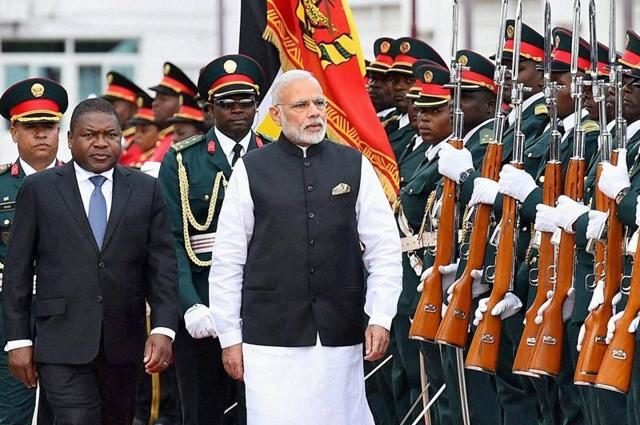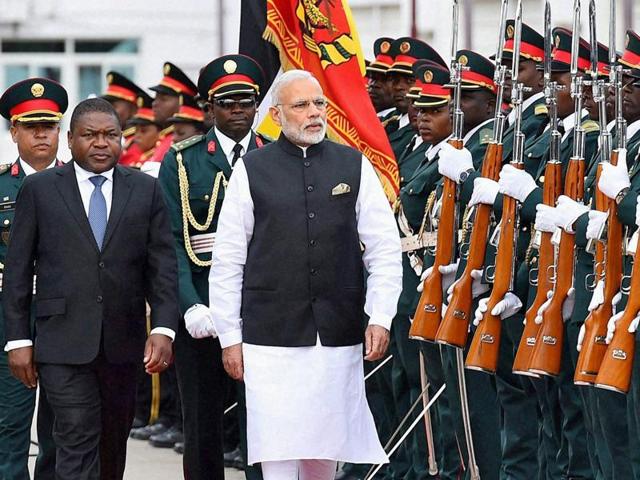
In the recent past, the Indo-Mozambican relations have scaled new heights. Both the countries share a very warm and cordial connection and the association that they have adhered through ages has a great degree of commonality. India and Mozambique share a similar past vis-a-vis colonialism and exploitation, hence in the current scenario, the challenges faced by India and Mozambique also share great similarities. With such a background it becomes easy for the two nations to work together for their socio-economic growth. Lying in the south eastern region of Africa, Mozambique has a population of around twenty-nine million. The nation is surrounded by the magnificent Indian Ocean in the east, with countries like Tanzania, Malawi, Zambia, Zimbabwe, Swaziland and South Africa as neighbours. Mozambique gained independence from Portugal in 1975 and till 1992 Mozambique suffered a devastating civil war.
India-Mozambique Relations
Soon after gaining independence in 1947, India started supporting the Mozambican freedom struggle. This laid the foundation for warm political ties between the two countries. With the attainment of Mozambican independence in 1975, diplomatic relations were established with India and the first diplomatic mission was set up in Maputo. Later, Mozambique opened its Mission in New Delhi in the year 2001. Trading links between Mozambique and India go back several centuries, and today trade between the two countries is worth USD 1.5 billion dollars. Major export commodities from India comprise of refined petroleum products and pharmaceuticals, while the most important export to India comprises coal and cashew.
Mozambique and India have also signed several bilateral agreements and Memoranda of Cooperation (MoC) for partnering in different sectors like agriculture, rural development, scientific and technical research, protection of investments, avoidance of double taxation of each other’s nationals, small and medium enterprises, mineral resources, oil and natural gas, and defence cooperation. Assistance provided by India to Mozambique comes in the form of concessional lines of credit, which are implemented through the EXIM Bank of India (High Commission of India, Maputo, 2017).
From Mozambique, till date, all four Presidents, Samora Machel (1982), Joaquim Chissano (1988 and 2003), Armando Guebuza (2010) and Filipe Nyusi (for India-Africa Forum Summit 2015), have visited India. From India, two Prime Ministerial visits were made to Mozambique. First visit was when former Prime Minister Indira Gandhi visited Mozambique in 1982 and the Second visit was made by incumbent Prime Minister Narendra Modi in July, 2016. During his visit to Maputo, PM Narendra Modi signed Memoranda of Understanding (MoU) in the fields of – drug trafficking, sports and trading of pulses (High Commission of India, Maputo, 2016). It was after President Guebuza’s visit in the year 2010 that the LOC-funded projects, carried out by India, were extended from USD 140 million to USD 500 million in Mozambique. This support has helped Mozambique in improving power generation and distribution, providing drinking water, improving production in agriculture, rehabilitation of irrigation infrastructure, building of an Information Technology Park, etc. (High Commission of India, Maputo, 2017).
The most significant form of support extended by India is in the form of scholarships and training opportunities provided to the Mozambican students in India. In February 2018, former Indian Minister of State for External Affairs, General (Dr.) V.K. Singh (Retd.) visited Mozambique and his visit was reciprocated by the Mozambique Foreign Minister Jose Condungua Antonio Pacheco, who arrived in New Delhi during November 2018. The then-External Affairs Minister Sushma Swaraj met with the Mozambique Foreign Minister for the Fourth India-Mozambique Joint Commission, where the two leaders discussed ways to strengthen cooperation in commercial, investment, defence, development and social sectors. They also explored means to enhance connectivity between the two countries. Moreover, they deliberated upon the need to escalate naval cooperation for boosting security in the Indian Ocean Region (IOR). Both the governments agreed to work together for cooperation in defence and security, judicial and consular systems, traditional medicine, and enhancing cultural exchanges. During the Joint Commission meeting, India and Mozambique also examined the importance of working towards shared concerns like smuggling, terrorism, piracy and poaching (MEA, 2018).
This year, Mozambique, Malawi and Zimbabwe were hit by a Category 4 Cyclone – ‘IDAI’. In the face of heart-wrenching devastation, the Government of India was amongst the first to extend support to the affected region and its people. Soon after the cyclone made its first strike, three Indian Navy ships in the Indian Ocean were diverted to Mozambique for Humanitarian Assistance and Disaster Relief (HADR). The ships undertook relief and rescue activities in coordination with the local authorities and the High Commission of India in Maputo.
Why is Mozambique Important for India?
Like most of Africa, Mozambique enjoys an abundance of natural resources. Subsequently, many Indian companies are investing large amounts in resources like natural gas and coal in the region. Two such leading companies are Oil and Natural Gas Corporation Videsh Ltd. (OVL) and Oil India Ltd. Furthermore, in the coal mining sector, the India-based International Coal Ventures Pvt. Ltd. stands as a renowned investor. In order to deepen the subcontinent’s engagement with Mozambique, substantial investments have been made with heightened interest in areas like healthcare, education, information technology and pharmaceuticals. Also, due to its strategic location and one of the longest Indian Ocean coastlines, Mozambique provides India a great opportunity for maritime cooperation. Over the year, India has also assumed an important role in protecting the Mozambican coast, in cooperation with the Mozambican navy.
Recent estimates suggest that in the near future Mozambique may have the fourth largest reserve of gas in the world behind Iran, Russia and Qatar. Hence, India’s engagement and investments in Mozambique’s energy sector are also increasing. Further, there is a need for greater engagement by establishing direct shipping lines between India and Mozambique, as trade and economic cooperation directly depend on it. In the year 2016, the Air Service Agreement was signed by the two countries to promote air connectivity, however, an official agreement for building a regular shipping line is yet to be discussed. For India and Mozambique, the need of the hour is enhanced cooperation on common concerns over the issue of safety and security of sea lanes of communication in the Indian Ocean Region (IOR).
Conclusion
To conclude, we see that India is picking up where it had left off in the 1980s, where during the Mozambican civil war, the Indian Navy helped Maputo fight the apartheid South Africa-backed Renamo rebel movement, which resulted in a non-hostile encounter between a South African strike craft and the Indian destroyer INS Godavari, off the Mozambican coast in 1986. In contemporary times, the Indo-Mozambican relationship promises remarkable growth for the African marvel. For India, Mozambique is expected to emerge as one of its top energy import sources. The nation is also likely to become one of the largest investment hubs for India in Africa. Furthermore, in the years to come, India will be Mozambique’s closest military ally across the western Indian Ocean.
Also read: http://diplomacybeyond.com/india-south-africa-diplomatic-relations-an-everlasting-bond/









